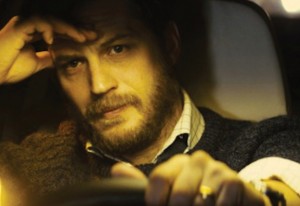LOCKE: 3 STARS. “a vehicle for Tom Hardy’s bravura performance.”
 In these days of maximalist moviemaking the new Tom Hardy film goes the opposite way, trimming the movie down to one claustrophobic setting and a single on screen actor. “Locke” is the first movie in recent memory that would probably work as well as a radio drama than it does a film.
In these days of maximalist moviemaking the new Tom Hardy film goes the opposite way, trimming the movie down to one claustrophobic setting and a single on screen actor. “Locke” is the first movie in recent memory that would probably work as well as a radio drama than it does a film.
Ivan Locke (Hardy) is a straight arrow construction foreman on a mission. “I will do what needs to be done,” he says, “whether they love me or hate me.”
The son of an absent father, he is determined to be at the birth of his child. In his car, he’s battling traffic for the hour-and-a-half drive to London and the mother-to-be’s hospital. Trouble is, the child is the result of a lonely one-night stand and he’s a married man.
Compounding his troubles is the timing of the birth. It is the eve of the biggest cement pour in European history, and he’s chosen his duty as a new dad over his loyalty to the construction company he’s worked at for nine years. Over the course of two hours and dozens of car phone conversations, his life disintegrates, but his resolve does not.
A review like this lends itself to many, many puns. “Locke” is a vehicle for Tom Hardy’s bravura performance. He face is the engine of the film, his talent the driver.
Now that we have that out of the way, let’s look at the film.
The entire film takes place in the front seat of Locke’s car, in real time, as he drives the M1. We see through the windshield, into the backseat and the display screen of car phone and GPS. Most of all we see Hardy’s face, which, even though obscured by a beard, still allows his charisma to ooze through. That’s a good thing because it is the actor—not the character or the situation—that makes “Locke” interesting.
It’s a character piece about a man who has learned what he doesn’t want to be; who is determined to do the right thing, “to be solid,” as he says. He’s an admirable man who has made mistakes, and Hardy pulls the drama out of the phone calls with his wife, his kids and soon-to-be-ex-boss. The situations individually aren’t that compelling, but placed side-by-side and filtered through Hardy, they become, if not exactly riveting—how riveting can extended conversations about cement pouring be?—at least engaging.
The set-up doesn’t limit Hardy as much as it hinders the story from truly taking off, from evolving into something more meaningful than watching a man deal with some serious life problems while trying not to get a speeding ticket. There are heightened emotions throughout, but as high as Hardy soars, the film grounds him with a gimmicky idea that keeps him car bound.
